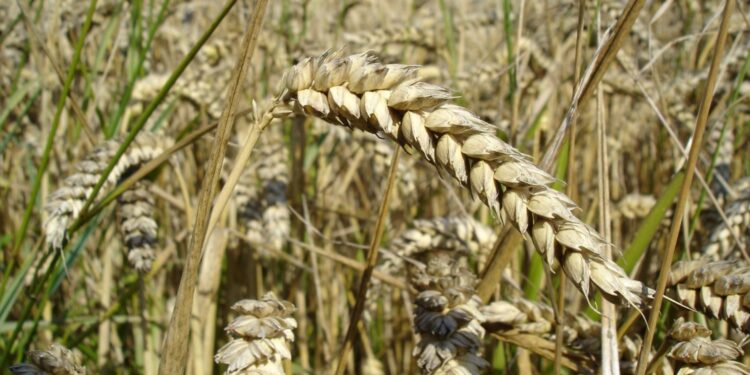Credit: Wikipedia
A material that could replace current fungicides (antifungal pesticides), increase food safety and help protect wildlife has been discovered.
A recent investigation undertaken by Pesticide Action Network (PAN) found that the UK still uses 36 harmful pesticides that have been banned in other European countries, 13 of which are described as “very dangerous” and have links to contamination water, cancer, infertility and other diseases.
Published in Green chemistryResearchers from the University of Nottingham have carried out a successful field trial of a material they developed to help protect crops against fungi.
Simon Avery, Professor of Eukaryotic Microbiology in the Faculty of Medicine and Health Sciences, said: “The tested material is not toxic but works by passively resisting the attachment of fungal spores to protect surfaces against infection. fungi, including crop surfaces. Trials with wheat are particularly encouraging as there are many opportunities to further optimize material properties for crop protection.
“We identified two lead candidate polymers through bioperformance testing using in vitro microplates and sheet-based assays. These were then entered into a program to optimize and scale up their synthesis and combine them into a spray formulation that could be used on crops. Our results showed that the material not only significantly reduced fungal infection by the fungus Septoria tritici by up to 26%, but also that the crop grew as well as the control group, thus offering an alternative that appears safer for the environment, wildlife and people, and it is also effective.
Sprayed directly onto wheat at conventional times for fungicides, the trial provided the first real-scale example of how the material interacts with crops. The small plot trial compared the two candidate polymers to a multisite fungicide and two commercial fungicide programs.
Valentina Cuzzucoli Crucitti, researcher at the Faculty of Engineering, said: “Wheat is one of the most economically and nutritionally important cereal crops, but there is a real challenge waiting to be solved, because 5 10% of yields are lost to fungi. infections, even with the use of resistant crop varieties and fungicides.
For the field trial, the university partnered with ADAS, an independent provider of agricultural and environmental advice.
Chloe Morgan, Senior Research Scientist in Arable Pathology at ADAS, said: “The results of the field trial were very promising, showing that the polymers have some level of effectiveness against Septoria tritici. With further optimization, they could play a critical role in future disease. As part of control strategies, either replacing or being applied in admixture with conventional fungicides, new polymers could also reduce the risk of fungicide resistance development, thereby extending the life of existing products.
Valentina said: “Our attention now turns to a second field trial planned this year to further refine and improve the polymer so that we can continue to turn our research into reality. The beauty of a material like this is its lack of toxicity. , the relative simplicity of its production and the fact that it can be easily scaled up, making it an incredibly attractive prospect for several other industries, not just agriculture.
More information:
Liam A. Crawford et al, A potential alternative to fungicides using active-free (meth)acrylate polymers for the protection of wheat crops against fungal attachment and infection, Green chemistry (2023). DOI: 10.1039/D3GC01911J
Provided by the University of Nottingham
Quote: Researchers discover an ecological fungicide alternative (January 9, 2024) retrieved January 9, 2024 from
This document is subject to copyright. Apart from fair use for private study or research purposes, no part may be reproduced without written permission. The content is provided for information only.



